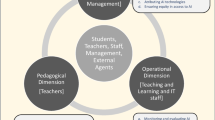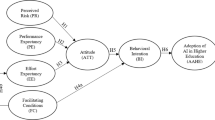Abstract
This paper highlights the effects brought about by the implementation of the Information Communication Technology (ICT) subject in the Zambian primary education curriculum. In particular, it shows how various schools have implemented the new subject, its effects on schools, challenges faced with implementing the subject and remedies to counter the challenges.
The paper then outlines and discusses findings of a study designed to investigate the effects in implementing the ICT in education subject in primary schools using data obtained from ten schools under Lusaka Province. Conclusions are drawn and suggestions made to address challenges and improve the subject adoption rate. Despite multiple policies around the importance and implementation of ICTs, the paper warns that without proper resources, infrastructure and administrative support, the effective implementation of the ICT in education subject cannot be achieved.


Similar content being viewed by others
References
Ajay, S. (2017). Use of information and communication technologies in. education, 7(3), 323–325.
Banda, I. (2016). The implementation of information communication Technology in the Primary Education Curriculum in selected schools of Chipata District, Zambia. Master’s thesis. University of Zambia.
Bishop, P. (2012). Information communication technology and school leaders. Handbook of educational leadership and management. Edinburgh Gate: Pearson Education Limited.
Bukaliya, R., & Mubika, A. K. (2011). Factors militating against the introduction of computer education in secondary schools. Journal of Education and Instructional Studies in the World, 2(3), 56–68.
Castells, M. (2001). Information Technology and Global Development). In J. Muller, N. Cloete, & S. Badat (Eds.), Challenges of globalisation. South African debates with Manuel Castells (pp. 152–167). Cape Town: MaskewMiller Longman.
Daniels J.S. (2002) “Foreword” in information and communication Technology in Education–a Curriculum for schools and Programme for teacher development. Paris:UNESCO.
Department of Education and Science (2008). ICT in Schools: Inspectorate Evaluation Studies. Retrieved from https://www.education.ie/en/. Accessed 20 Aug 2018
Development Cooperation Directorate. (2004). ICTs and economic growth in developing countries. Development Assistance Committee.
Dzidonu, C. (2010). The role of ICTs to achieving the MDGs in education: An analysis of the case of African countries. The Division for Public Administration and Development Management of the United Nations Department of Economic and Social Affairs (UNDESA).
Farrel, G., & Shafika, I. (2007). Survey of ICT and education in Africa: A summary report based on 53 country surveys. Washington, DC: info/Dev/World Bank.
Federal Republic of Nigeria. (1988). Report on national on computer education. Lagos. National Committees on Computer Education.
GRZ. (2013). Zambia education curriculum framework. Lusaka: MOE.
Habeenzu, S. (2010). Zambia ICT sector performance review 2009/2010, “towards evidence-based ICT policy and regulation volume two, policy paper 17, 2010 www.researchictafrica.net/zambia-ict-sector-performance-review2009/2010.Html. Accessed 18 Sept 2017
Haydn, T. (2001). Subject discipline dimensions of ICT and learning: History, a case study. Retrieved from http://www.centres.ex.ac.uk/historyresource/journal3/haydn.doc. Accessed 5 Aug 2018
Hennessy, S. (2010). Developing the use of information and communication technology to enhance teaching and learning in east African schools: Review of the literature. Nairobi: Aga Khan University.
Hristoski Ilija S. and Olivera B. Kostoska (2017), System dynamics approach for the economic impacts of ICTs: evidence from Macedonia.
IFIP-UNESCO. (2006) ICT curriculum for secondary schools. Retrieved from http://www.ifip-tc3.net/article.php3?id_article=41. Accessed 25 Feb 2018
Inayatullah, S., & Leggett, S. (Eds.). (1999). Transforming communication: Technology, sustainability and future generations. Westport, Ct: Praeger and Adamantine Studies on the 21st Century.
Isaac, S. (2007). Survey of ICT and education in Africa: Zambia country report. New York: World Bank.
Jhurreev, V. (2005). Technology integration in education in developing countries: Guidelines to policy makers. International Education Journal [Electronic], 6(4), 467–483 Available:http://ehlt.flinders.edu.au/education/iej/articles/v6n4/jhurree/paper.pdf. Accessed 27 Jan 2018
Kinyanjui, L. W. (2003). A survey on ICT access and use in secondary schools. Nairobi: School Net Africa.
Krysa, R. (1998). Factors affecting the adoption and use of Computer Technology in Schools. University of Saskatchewan.
Laaria, M. (2012). Leadership challenges in the implementation of ICT in public secondary schools, Kenya, Journal of Education and Learning Vol. 2 No. 1: 2013 32–43. Retrieved on 10th March 2018 from https://doi.org/10.5539/jel.v2n1p32.
Magambo, J. (2007). Use of information and communication technologies (ICTs) in teacher education in sub-Saharan Africa: Case studies of selected African universities. (unpublished PhD thesis). Cologne: University of Cologne.
Malcom, E. & Godwyl. (2008). Diffusion on Information Communication technology in selected Ghanaian schools. Retrieved in August 2018.
Marker, P., McNamara, K., & Wallace, L. (2002). The significance of information and communication Technologies for Reducing Poverty. London: DFID.
Mingaine, L. (2013). Challenges in the implementation of ICT in public secondary schools in Kenya. International Journal of Social Science and Education, 4, Issue 1.
Ministry of Communications and Transport (MOCT). (2006). National Information and communication technology policy. Lusaka: GRZ.
Ministry of Education (MOE). (2007). National ICT policy. Lusaka: Ministry of Education.
Ministry of General Education (MOGE). (2013). The Zambia education curriculum framework 2013. Lusaka: CDC.
Moon, B. (2004). Open Learning and ICTs: A Radical Solution to Preparing Teachers to Meet the Universal Basic Education (UBE). The Open University. United Kingdom.
Mulenga, C. L. (2016). The implementation of computer studies in selected public primary schools in Ndola district of Zambia: Failure or success. Master’s Thesis, University of Zambia.
Ndwiga, S.P. (2005). An appraisal of the incorporation of computer courses in Kenya diploma teacher colleges. Nairobi, Unpublished Master’s Thesis, Kenyatta University.
New Partnership for Africa’s Development (NEPAD). (2001).
Patton, M. Q. (1990). Qualitative evaluation and research methods (2nded.). Newbury Park,CA: Sage Publications. Inc.
Phiri, J.T.N. (2012). ‘Welcome’, the southern African ICT for education summit, Elephant Hills resort, Victoria Falls, Zimbabwe, 26th -27th January 2012.
Republic of Kenya (2005). Sessional paper no. 1 of 2005 a policy framework for education, training and research, Nairobi.
Republic of Kenya (2006a). The national ICT strategy for education and training, Nairobi.
Republic of Kenya (2006b). Kenya education sector support Programme, 2005–2010).
Sallimah, S., & Abdullah, L. (2007). Making a difference: ICT in university teaching/learning and research in southeast Asian countries (pp. 1–11). Jakarta, Indonesia.
Saverinus, K. (2008). The role of ICT In Education Sector, inside magazine, Vol.02 July, 2008. http://verykaka.wordpress.com/2008/07/25/the-role-of-ict-in-educationsector. Accessed 06/01/2017.
Sichone, C. (2011). ‘ZICTA responds to school ICT curricula challenges’. Times of Zambia: p.9.
Simulwi, L. (2018). The impact of making ICT subject compulsory at junior secondary in Livingstone District. Master’s dissertation. University of Zambia.
Sub-Saharan Africa, Education for All. (1999). A framework for action in sub- Saharan Africa: Education for African renaissance in the twenty-first century. Adopted by the Regional Conference on Education for All, Johannesburg, South Africa, 6–10th December 1999.
Thompson, J. (2007). Is education 1.0 ready for web 2.0 students? Innovate: Journal of online education. Fischler School of Education and Human Services at Nova Southeastern University.
United Nations Educational, Scientific and Cultural Organisation. (2015). ‘ICT in education in sub-Saharan African’ Retrieved https://unesdoc.unesco.org. Accessed 10 Sept 2018
United Nations Educational, Scientific and Cultural Organisation (UNESCO) (1995). ‘ICT Policy’ http://www.unesco.org/new/en/unesco/themes/icts/policy. Accessed 17 Dec 2017
Violet, M., 2018. ICT education in schools: Pros, cons, Zambia daily mail, September 10th, P.10.
Wagner, D.A. (2001). IT and Education for the Poorest: Constraints, Possibilities and Principles. Knowledge Enterprises, Inc. http://www.TechKnowLogia.org. 3(4), p48–50.
Waiharo, P. K. (2007). Sustainability of ICT in Kenya secondary schools. A case study of secondary schools in north Eastern Province. Nairobi: Unpublished Master’s thesis, Kenyatta University.
Williams, A. F. (2004). ‘Voicing diversity’: How can I integrate WebQuests and Moodle into religious education at second level? Dubln: Dublin City University.
Yoloye, V. O. (1990). Use and perception of computers by educationists at the University of Ibadan. Ilorin Journal of Education, 10, 90–100.
Yusuf, M. O. (1998). A study of the dimensions of teachers’ attitude toward computer education in Nigerian secondary schools. Nigeria Journal of Computer Literacy, 2(1), 47–58.
Author information
Authors and Affiliations
Corresponding author
Additional information
Publisher’s note
Springer Nature remains neutral with regard to jurisdictional claims in published maps and institutional affiliations.
Rights and permissions
About this article
Cite this article
Nyanja, N., Musonda, E. A review of the ICT subject implementation in schools: a perspective of Lusaka Province (Zambia). Educ Inf Technol 25, 1109–1127 (2020). https://doi.org/10.1007/s10639-019-10014-4
Received:
Accepted:
Published:
Issue Date:
DOI: https://doi.org/10.1007/s10639-019-10014-4




